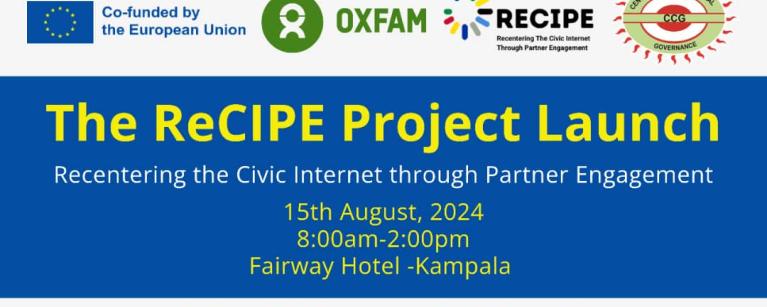FOR IMMEDIATE RELEASE
(Kampala, 15th August 2024) Oxfam, in partnership with the Center for Constitutional Governance (CCG), has today launched the ‘Recentering the Civic Internet through Partnership (ReCIPE) project’, an initiative funded by the European Union and valued at €270,000. The three-year project (2024 – 2027) aims to leverage digital technologies to amplify the voices of people in Uganda and ensure their interests are represented in the digital sphere.
The project implemented in 10 countries, including Uganda, targets civil society organizations, civic activists, and community members who constitute or represent communities to improve their digital literacy, capacity for influence in decision-making spaces, and ability to partner with other stakeholders on digital rights threats and opportunities. It also targets tech companies and government authorities to foster the creation and enforcement of effective laws and policies on digital rights.
The internet and other digital technologies are critical tools for advancing human rights and helping address some of society’s most pressing problems. However, digital technologies can also be used to curtail rights and deepen inequality. In an era where the internet and digital tools have become integral to daily life, the ReCIPE Project will work to reach over 10 million internet users in Uganda, ensuring that these technologies serve the public good and that the voices of all citizens are heard in the digital space.
Speaking at the launch, Oxfam in Uganda Country Director Mr. Francis Shanty Odokorach highlighted the human-centric approach of the project. “The ReCIPE Project is not just about technology. “It is about people. It is about creating a digital ecosystem where every Ugandan can participate, contribute, and thrive.” He stated. “Through this project, we aim to influence and shape policies and legal frameworks that govern digital interactions, ensuring that these spaces are inclusive, fair, and reflective of the needs of all citizens,’’ Francis added.
The project contributes to Oxfam in Uganda’s strategic objective of advancing inclusive and accountable governance systems that promote the rights of vulnerable people. It aligns with the government’s commitment to digital transformation, as outlined in the Digital Transformation Roadmap, the Digital Vision Uganda 2040, and other related initiatives.
Dr. Chris Baryomunsi, the Minister of Information, Communications Technology, and National Guidance, officiated the launch. Participants included the European Union and other key players in the digital economy, including Mr. Joseph Kigozi, the Next Media Deputy CEO, telecom companies, media legal practitioners, Civil Society Organizations, innovators, and women-led organizations.
While ending his remarks, Mr. Francis Shanty Odokorach appreciated the efforts of all stakeholders and emphasized the value of stakeholder collaboration and accountability. “Let us remember that the true measure of success for any digital initiative lies not in the technology itself but in the lives, it touches and the communities it transforms,” he concluded.
For media inquiries, please contact
Dorah Ntunga | Media and Communications Coordinator – Dorah.Ntunga@oxfam.org
Target Reach: 10 million
Project Duration: 2024 – 2027
Total Budget: €270,000
Geographical coverage: National
The 10 countries and partners implementing the ReCIPE project
The ReCIPE project is led by Oxfam and implemented with partners in the following countries: Senegal, Cambodia, Somalia, Vietnam, Tunisia, Kenya, Uganda, Occupied Palestinian Territory, El Salvador, and Bolivia.
About Oxfam in Uganda
Oxfam in Uganda is part of the Oxfam Confederation, a global movement of people fighting to end inequality and injustice. In Uganda, our work is guided by the Country Strategic Framework (2021-2030), organized around four themes: Governance and Accountability, Resilient Livelihoods, Humanitarian preparedness and response, and Gender Justice and Women's Rights. All the themes work towards influencing policy and practice, promoting youth and women empowerment, inclusive participation in decision-making at various levels, and capacity strengthening of national and local actors.
